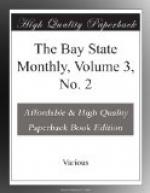In the meetings of the Church for conference and prayer, he was often very helpful. He had too much reverence for the place and object of the assembly, to indulge in crude and repetitious utterances. He prepared himself for the duty, by recalling the lessons of his own experience or citing illustrations from the wide stores of his reading. His words were well chosen, and his thoughts seldom common-place. In the exigencies of the missionary cause, or on some occasion of special peril to the truth he would bring forward an instance of signal deliverance from similar trial, in the previous history of the Church, or in the lives of her servants. There were those, who might speak with more fluency, or employ a more impassioned manner, but no one spoke more to edification. His prayers also were marked by the same evident thoughtfulness and spirituality. He was not hasty to offer his desires before God. You felt, in following his petitions, that he had a message, and his voice would often be tremulous with emotion as he made supplication in behalf of the sick or the sorrowful; as he prayed for the youth of the congregation, or interceded in behalf of the Church and the country. As an officer of the Church, he was considerate of the feelings and wants of his brethren; visiting the sick, searching out the poor, and practicing a generous hospitality. Ministers of all denominations were welcome to his house, and among his chosen friends there were none held in higher esteem than the ministers whom he loved for their works’ sake.
Deacon David was averse to strife and controversy; the convictions which he cherished had been matured by careful study, and he was ready to give them expression on all suitable occasions; but he avoided personal disputes, and the imputations that accompany heated discussion. He knew that these controversies were unprofitable, and he consequently sought “the things that make for peace.” When differences arose and bad feelings were likely to be stirred, he was happy if he could remove or allay the cause of alienation.
As a citizen, Deacon David exhibited a hearty interest in the prosperity of the town, and he did not shrink from the duties by which the community is served. He wished to have good schools, well made roads, and all public buildings convenient and in good repair. A modest man, not seeking office for himself, and always ready to commend good service when rendered by others, he did not decline when called to take office. He accordingly acted as a select-man, representative to the Legislature, member of the School Committee, in addition to special services when some interest or enterprise affecting the community was given in charge to a committee to act in behalf of the town.




